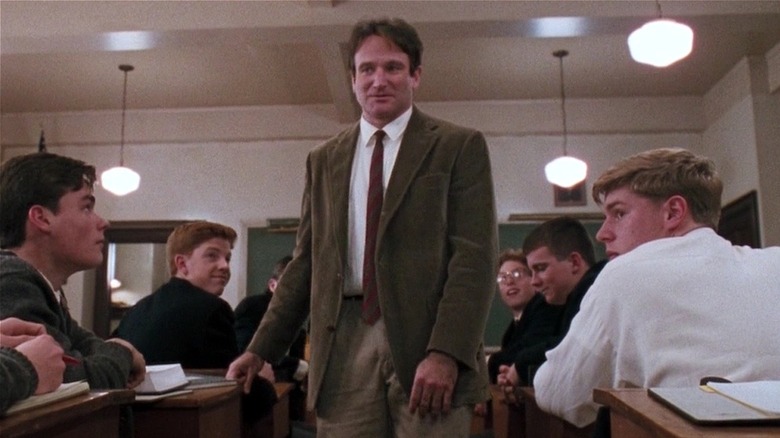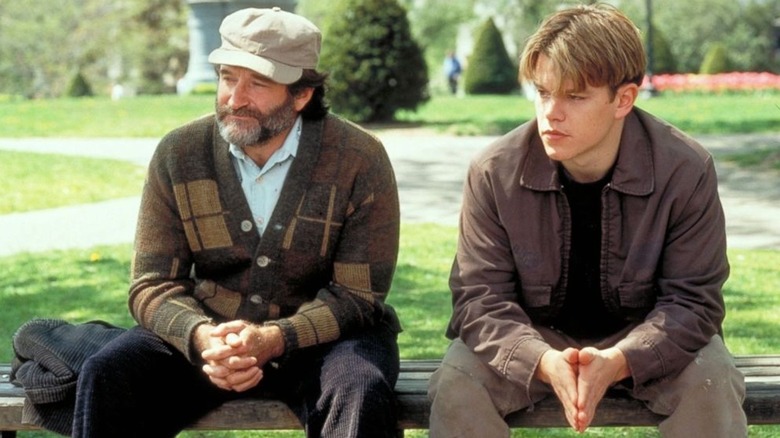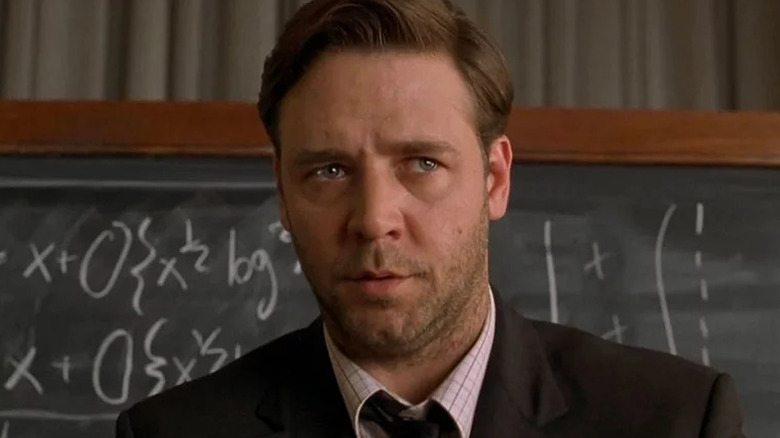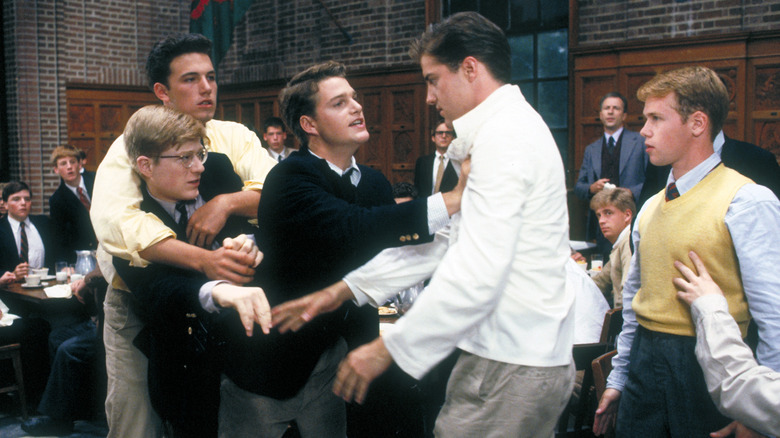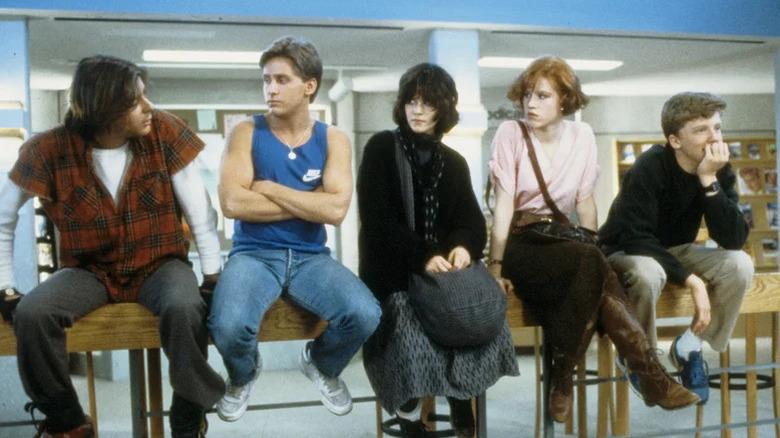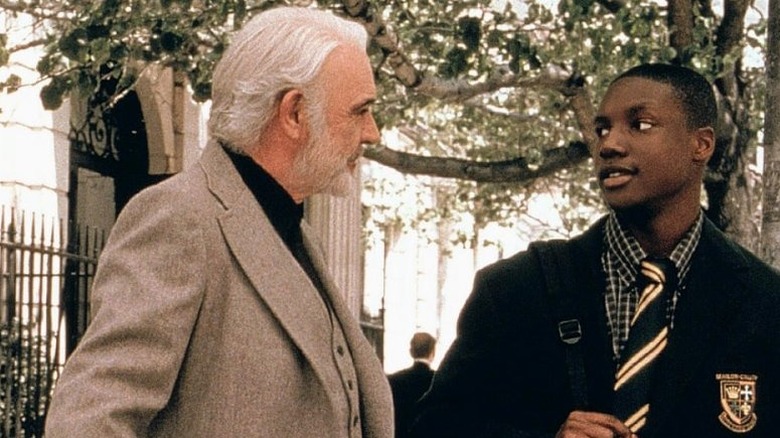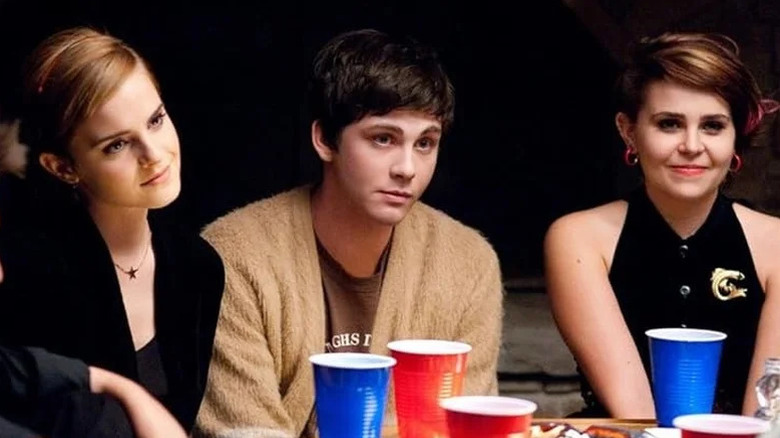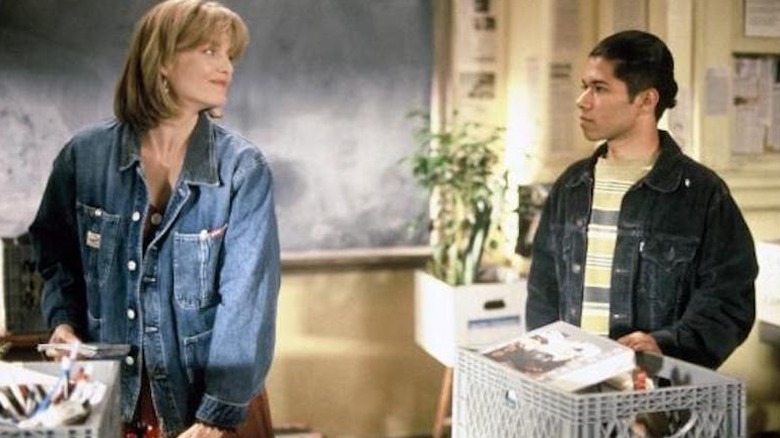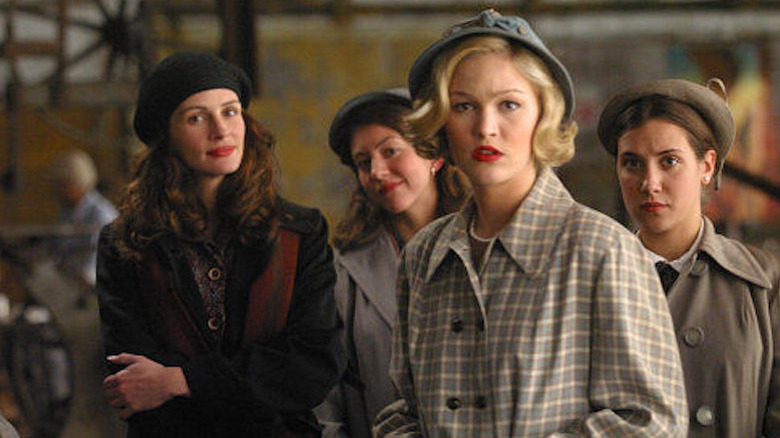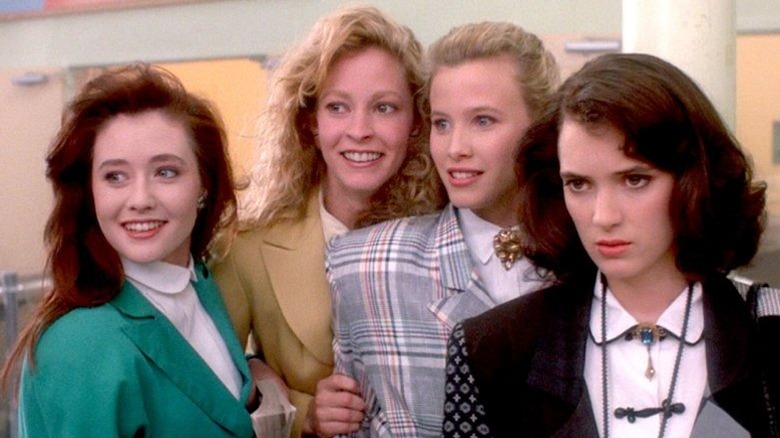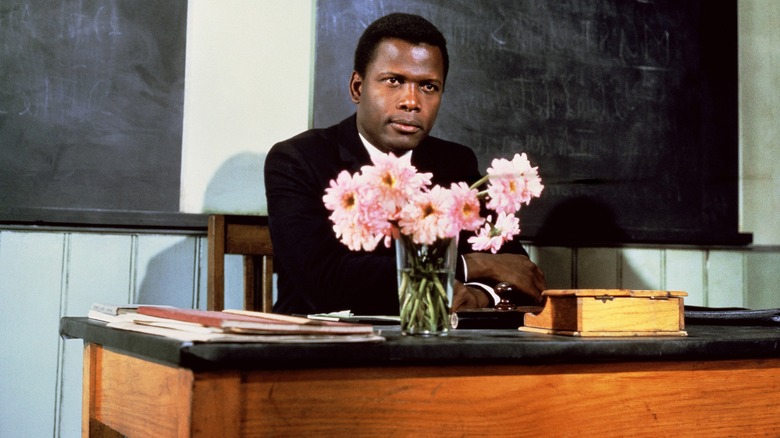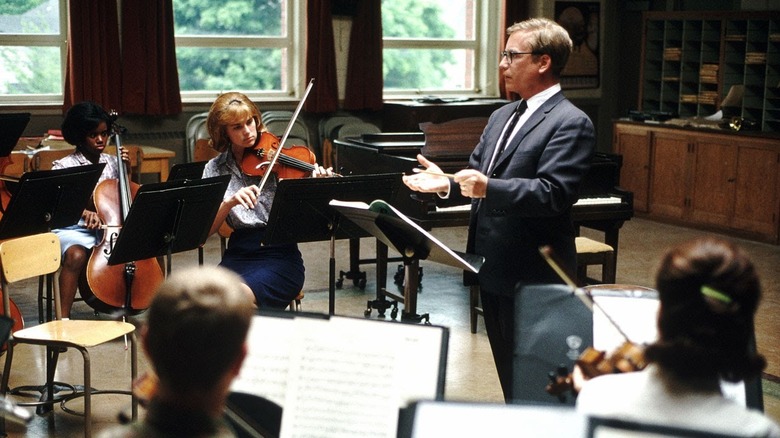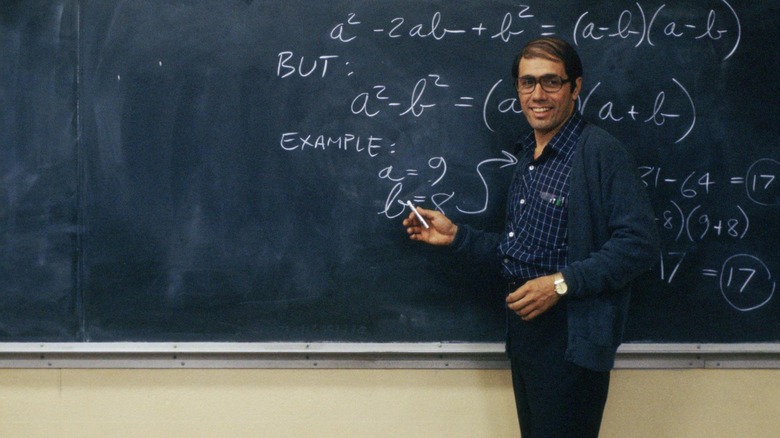12 Best Movies Like Dead Poets Society
When "Dead Poets Society" came out in 1989, the late Robin Williams was still trying to shed his career-making image as slapstick space alien Mork from Ork from "Mork & Mindy," despite having already done films such as "The World According to Garp" and "Good Morning, Vietnam."
As unorthodox English teacher John Keating, Williams stepped into a more serious and inspirational role with "Dead Poets Society," leaving a lasting cinematic impression. The film cast him as the motivational mentor to a tight-knit group of friends at the strict Welton Academy all-boys boarding school in the 1950s, including new student Todd Anderson (Ethan Hawke), talented actor Neil Perry (Robert Sean Leonard), and lovestruck Knox Overstreet (Josh Charles). The repressed students soon band together as the Dead Poets Society, a group they secretly created after Mr. Keating opened their eyes to a world of possibilities through poetry.
Though much of the movie is uplifting, "Dead Poets Society" takes a dark turn toward the end that leads the film in an unexpected direction — but it's that devastating plot twist that makes the movie so memorable.
While "Dead Poets Society" wasn't the first gripping film to take place in a school setting, it took on-screen self-discovery of both students and teachers to new heights and left an indelible mark. So, in the spirit of Mr. Keating, here are 12 other films similar to "Dead Poets Society" that should be watched if you're in the mood for inspirational school-based fare with a twist.
Good Will Hunting
Robin Williams won his first and only Oscar for playing psychotherapist Dr. Sean Maguire in 1997's "Good Will Hunting," the movie that made Matt Damon and Ben Affleck household names.
The fictional film, directed by Gus Van Sant, follows a struggling young janitor named Will Hunting (Damon), whose genius-level mathematical skills are discovered by an MIT professor (Stellan Skarsgard) who tries to help him get his life on track. With an underlying theme of self-discovery and unlocking one's full potential, "Good Will Hunting" has a feel-good appeal to it, despite some dark concepts.
At the time of its release, "Good Will Hunting" was a buzzed-about sleeper hit that built momentum based on its mundanely riveting introspective storyline intertwined with the culture clash between Boston's blue-collar values and the city's prestigious academic institutions like MIT. Its lasting legacy, however, may always be that it was the movie that unleashed Matt and Ben upon the world.
A Beautiful Mind
This adapted biographical film, directed by Ron Howard, stars Russell Crowe as John Nash, a prominent mathematician whose onscreen journey begins in the 1940s as a graduate student at Princeton University and ends with him winning the Nobel Prize in the 1990s. Along the way, Nash joins the faculty at MIT but struggles with mental illness and paranoia surrounding a secret code-cracking assignment he becomes embroiled in alongside the U.S. government. By the end, he unorthodoxly works his way through both troubling situations with the help of his devoted wife (Jennifer Connelly), whom he met when she was a student at MIT.
When "A Beautiful Mind" came out in 2001, Crowe was riding a huge wave of success from the blockbuster film "Gladiator," for which he won an Oscar for Best Actor. He received much praise (and another Oscar nod) for his portrayal of Nash, although some critics thought "A Beautiful Mind" trivialized the real-life struggles faced by people with schizophrenia.
School Ties
After receiving a football scholarship to an elite all-boys boarding school in Massachusetts, working-class kid David Greene (Brendan Fraser) finds himself hiding his Jewish background out of fear of being targeted and discriminated against by his new friends and teammates, who are mainly well-to-do WASPs (White Anglo-Saxon Protestants). But, of course, his secret gets out, and he must confront the hatred and bigotry head-on.
In that sense, "School Ties" has a perennial feel, even though it is set in the 1950s and was released in 1992, as antisemitism and the struggle between the haves and have-nots continue to persist in society. At the time of release, though, despite mostly positive reviews and having an up-and-coming cast that included Matt Damon, Ben Affleck, and Chris O'Donnell, the movie fell flat with audiences at the box office, bringing in less than $15 million.
In hindsight, however, it's often remembered as a valuable film that addressed antisemitism and helped launch the careers of a new set of Hollywood stars.
The Breakfast Club
While "The Breakfast Club" is often lumped in with other more frivolous '80s Brat Pack fare that included "Pretty in Pink" and "St. Elmo's Fire," the iconic film about a band of misfit students who are forced to interact one Saturday afternoon during all-day detention has easily risen to the top as the cream of the crop of that era.
With known troublemaker John Bender (Judd Nelson) as the ring-leader, "The Breakfast Club" kids — which were rounded out by popular girl Claire Standish (Molly Ringwald), nerdy Brian Johnson (Anthony Michael Hall), star athlete Andrew Clark (Emilio Estevez), and mysterious loner Allison Reynolds (Ally Sheedy) — went on a sharp-witted journey of self-discovery, and some would argue redemption, that still leaves it in a class of its own to this day.
Directed by the hit-cranking John Hughes, the 1985 film changed the cinematic landscape of coming-of-age films forever by portraying teens as complex characters and has left a lasting legacy that continues to have pop-culture cachet 40 years later.
Finding Forrester
When 16-year-old Jamal (Rob Brown) breaks into an apartment on a dare, his life is forever changed when he forms an unlikely friendship — and mentorship — with the eccentric recluse who lives inside.
With Sean Connery playing the namesake William Forrester, "Finding Forrester" peels back layers on both aimless characters as they help one another find a passion for life through writing. It is as much about an anti-social old man rediscovering his purpose as it is about helping a student reach his full potential.
Released in 2000, "Finding Forrester" was helmed by director Gus Van Sant, who had just struck Oscar gold three years earlier with "Good Will Hunting." Yet, while the two films have a similar feel, "Finding Forrester" flew much more under the radar, earning just $80 million at the worldwide box office compared to the $225 million haul of "Good Will Hunting." But that doesn't make it any less of a worthwhile watch.
The Perks of Being a Wallflower
In "The Perks of Being a Wallflower," a shy 15-year-old named Charlie (Logan Lerman) struggles to fit in upon entering high school, until some galvanizing seniors (including Emma Watson as Sam) befriend him and help him spread his wings. But underneath his burgeoning progress, Charlie struggles with coming to terms with his middle school friend's suicide, a dark childhood secret, and his own mental health issues, which eventually spiral out of control.
Based on the Stephen Chbosky novel of the same name, "The Perks of Being a Wallflower" has the unusual distinction of being directed by the same person who wrote the teen tome, with Chbosky penning the book in 1999 and helming its silver screen adaptation in 2012.
The limited-release film grossed just $33 million but has since become a cult favorite, perhaps ironically because in recent years the young adult book has been banned by some U.S. schools due to claims of it being too sexually explicit while featuring LGBTQ-friendly content and discussion of abortion.
Dangerous Minds
Based on the autobiography "My Posse Don't Do homework" by former Marine-turned-high school teacher LouAnne Johnson, "Dangerous Minds" features Michelle Pfeiffer as an unpolished educator who takes on a pilot program for gifted but underachieving students at a tough inner-city high school in California. After a disastrous start, she uses unconventional methods to engage the inhospitable students in hopes of bettering their lives.
The 1995 film received a mixed bag of reviews upon its release, including some that were critical of the stereotypes and cliches used, but still became a commercial success, most likely due to the fact that Pfeiffer was just coming off of portraying Catwoman in the pop-culture phenomenon "Batman Returns." When revisiting the film 30 years later, it's best viewed as a formula-hugging slice of American cinema from the late-20th century whose legacy includes helping make rapper Coolio a household name by featuring his song "Gangsta's Paradise" on the soundtrack.
Mona Lisa Smile
A poignant Julia Roberts-led film from 2003, "Mona Lisa Smile" tells the story of a young educator hired to teach art history at the prestigious all-female Wellesley College. Set in the 1950s, an eager Katherine Watson (Roberts) sets out to challenge the expectations that both society and the school set for young women, especially when it comes to marriage and personal aspirations. Moving away from stodgy textbooks toward real-life artwork with modern interpretations, Katherine's students start to see the world through a different lens.
Roberts received a historic payday of $25 million for starring in the film, which also featured Kirsten Dunst and Maggie Gyllenhaal. Despite the colossal paycheck, though, "Mona Lisa Smile" got mixed reviews and a middling reception at the box office, being belittled by USA Today for being "'Dead Poets Society' as a chick flick." Still, it helps fill a void when it comes to feel-good female-centric films about the academic bond between teacher and students.
Heathers
This 1989 black comedy "Heathers" satirically takes on the high-school movie trope, with over-the-top white-bread characters like the croquette-playing trio of girls named Heather and dim-witted jocks with nicknames like Ram who rule the school that Veronica Sawyer (Winona Ryder) attends. She half-heartedly runs with the dominant preppy clique until a new kid in town, a homicidal loner named J.D. (Christian Slater), catches her eye.
Taking advantage of Veronica's doe-eyed desperation to shake things up at school, J.D. uses her popularity to embark on a deadly rampage that only seems to make the school more unified in its superficial obsession with vanity culture. While trying to clean up the mess she helped make, Veronica befriends other misfit students and successfully disrupts the high school hierarchy.
Still in a class by itself, "Heathers" came out at a time when John Hughes-era slick, stylized teen films with feel-good endings were flooding theaters, offering a more cynical and campy depiction of the high school experience.
To Sir, With Love
Proving the timeless nature of inspirational student-teacher films, 1967's "To Sir, With Love" is about an out-of-work engineer (Sidney Poitier) who accepts a high school teaching position at a school in a rough-and-tumble area of post-war London that's known for being populated with troublemakers.
As Mark Thackeray, Poitier struggles to connect with the classroom full of rowdy white students before deciding to approach the situation with a calm demeanor and a show of respect that he hopes will raise their regard for him and themselves. His technique eventually wins over the students, who call him "sir," and helps them appreciate the value of education.
Despite being based on E.R. Braithwaite's 1959 autobiographical novel of the same name, "To Sir, With Love" may exhibit flaws in the storyline to contemporary viewers when it comes to racial imbalance, as with many films of the time. But it remains one of Poitier's most memorable performances, as he had recently won an Oscar for "Lilies of the Field" and he had two other highly successful films released that same year, "In the Heat of the Night" and "Guess Who's Coming to Dinner," solidifying his place in Hollywood.
Mr. Holland's Opus
"Mr. Holland's Opus" follows the transformative 30-year teaching career of aspiring composer Glenn Holland (Richard Dreyfuss), highlighting how the position he originally considered to be temporary changed his life — and the lives of his students too.
The 1995 film covers the 1960s through the 1990s, as Mr. Holland goes from using the job as a means to pay the rent while struggling with achieving his lifelong dream of composing a masterpiece to realizing that his day-to-day educational efforts to introduce young minds to the joy of music was the real measure of his success.
Like other inspirational student-teacher films, "Mr. Holland's Opus" plucks at the heartstrings, especially when it reaches its unexpected climax that shows how teachers help students thrive, and how those students give back when least expected.
In real life, the film inspired Michael Kamen, who scored the film, to start The Mr. Holland's Opus Foundation, which donates high-quality instruments to underfunded music programs and schools.
Stand and Deliver
The 1988 biographical film "Stand and Deliver" follows an overachieving high school math teacher who is convinced that his aggressively unmotivated and dropout-prone students have the potential to pass the Advanced Placement exam in calculus.
Based on the true story of Jaime Escalante (Edward James Olmos), "Stand and Deliver" is set in a gang-driven East Los Angeles high school that is filled with low-income Latino kids who have little to no interest in education. With the school on the verge of losing its accreditation due to the dropout rate, Escalante decides the best way to help his struggling students is to diligently teach them calculus and help them pass the rigorous AP test.
Proving it has stood the test of time, the film has been preserved in the National Film Registry by the Library of Congress for its cultural significance since 2011, alongside such classics as "2001: A Space Odyssey" and "The Wizard of Oz."
